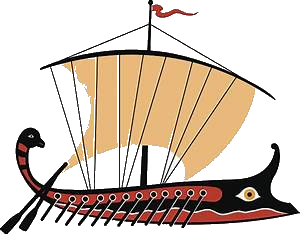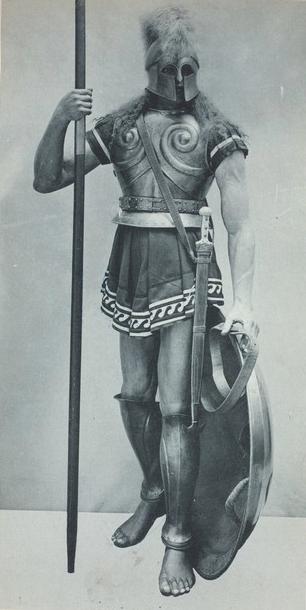Ancient Greece -- School-age
Time Periods of Ancient Greece
Sub-Mycenaean Period and Early Iron Age
Minoans and Myceneans
The Mycenaean civilization was patriarchal and the people were warriors. Around 1250 BCE the city of Troy in northern Turkey was raided. Stories of the Trojan War were passed down for hundreds of years by singers until being written down by the poet Homer around 700 BCE
During this time they began to have kings. Some Greeks learned to write, in a sort of hieroglyphics called Linear B.
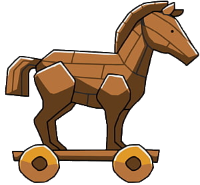
Trojan Horse
Decoding the mysterious language dubbed Linear B
Ancient Greece: The Trojan War videos at BBC Teach
Make your own Trojan Horse Paper Craft
Geometric Period (1000-900 BCE)
The Geometric period was given that name because of the way in which pottery was decorated, in plain angular patterns
Make your own Pinch Pots and decorate with geometric shapes.
Design a Greek Pottery Designs
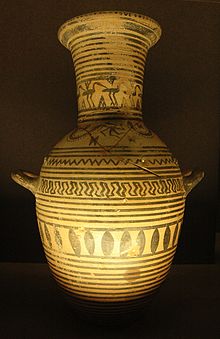
Boeotian Geometric Hydria lamp
Archaic Period (900-510 BCE)
Emergence of the city-state across Greece and new styles of warfare, art and politics. New colonies established by the Greeks in Italy, Egypt, Asia Minor and the Black Sea.
Literacy returned during the Archaic Period with a new writing system, the Greek alphabet.
In 776 BCE were held the first Olympic Games in Olympia.
The Greek Alphabet
Alpha. Beta. Gamma. Delta. The word "alphabet" comes from the Greeks alphabet. Put together the first two letters of the Greek alphabet "alpha" and "beta".
and you get alphabet.
Ancient Greece Alphabet Worksheet Find the mistakes in Spiros letter home then translate.
Reading Comprehension with the Greek Alphabet Spell out the answers to questions using the Classic Greek Alphabet.
The Ancient Greek Alphabet Video
Classical Period (510-336 BCE)
Greek city-states flourish until overshadowed by the powerful Macedonian kings. The Athenian statesman Cleisthenes (570-508 BCE) is regarded as the founder of Athenian democracy.
In 431 BCE Ancient Greece was a large collection of rival city-states.
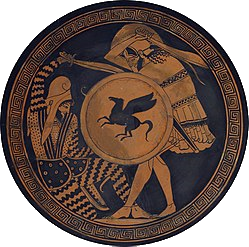
The Persian Wars (499-479 BCE)
547 BCE: Ionian Greek colonies in Asia Minor fall under Persian rule.
499 BCE: Ionian Greek colonies revolt against Persian rule. Fellow Greeks (specifically, Athens) sent troops to support this revolt.
493 BCE: Darius the Great of Persia suppresses the revolt.
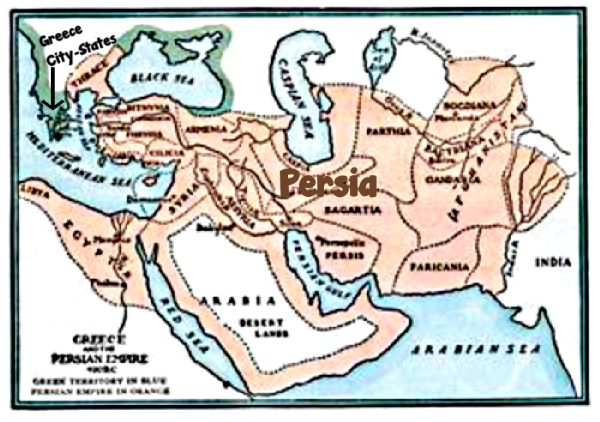
King Darius sought revenge on the Athenians and the Eretrians, Greeks who had previously backed the Ionian revolt against Persian rule. In 490 BCE, King Darius led his Persian army in an attack on Greece which resulted in the Battle of Marathon. For eight days, the two armies stood confronting each other at Marathon. On the ninth day, the Persians started an advance.
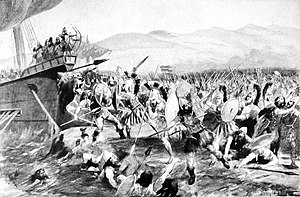
Battle of Marathon
The Persians were the larger army, however, their fighting style was defensive. Their main weapon was the bow and arrow, and their key tactic was to wait until the enemy came close, at which time the Persians would “bury” them a heavy barrage of bows and arrows.
The Athenians, had a new way of fighting which was a more offensive fighting style. Their main weapon was the long, heavy spear, and they shielded themselves with heavy armament including helmets, shields, and breastplates. They favored close combat battle formations, lacking both cavalry and bows.
Athens would win the battle and the Persians would sail away in defeat. This battle is considered one of the most important events marking the birth of European culture.
Ten years later, the Persians, with their king Xerxes (ZERK-sees) attacked the Greece mainland. This time most of the cities in Greece banded together and formed a league to fight the Persians. The Spartans and Athenians fought side by side. The Greeks and Persians had almost equal troop numbers. However, the Persian fleet outnumbered the Greek ships three to one.
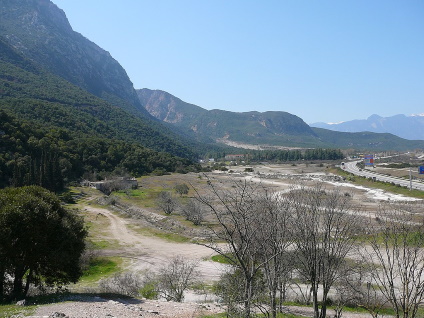
The pass of Thermopylae
The Greeks lost their first battle, at Thermopylae (therm-AH-pill-aye), but they won after that, a great naval victory at Salamis and in the spring of 479 BCE a battle at Plataea. Again the Persians went home defeated.
The Greco-Persian War in Review Video
After the Persian Wars, most of the Greek city-states became allied with either Athens or Sparta. Athens was a great naval power and Sparta relied on its army for superiority. In 431 BCE these alliances went to war against each other in a conflict called the Peloponnesian War. The war lasted 27 years and is named for the Peloponnesus, the peninsula on which Sparta is located.
The result of the war was crushing defeat of Athens and its maritime empire. The long term result was the weakening of all the city-states. This made them weak and vulnerable to a takeover by Macedonia.
King Philip II of Macedon had noticed that the Greeks were very weak. He would attack Greece and little by little he take it over until he would rule Greece. King Philip II was assassinated in 336 BCE.
Hellenistic Period (336 - 31BCE)
Hellenistic Period, a combination of Greek and western Asian cultures, lasts from the accession of Alexander the Great to the throne of Macedon in 336 BCE time until the beginning of the Christian era. This was the time of the great philosophers Socrates and his student Plato.
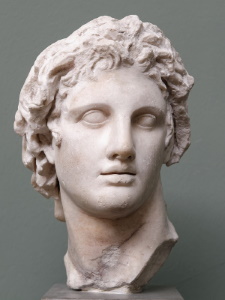
Alexander the Great
Alexander was born in 356 BCE in Pella, Macedonia, to King Philip II. Alexander was 20 years old when he became king.
Alexander spent most of his reign on military campaigns through northeast Africa and southwestern Asia. He would conquer the lands of the Persian Empire and many of lands. His empire would span from Greece and Egypt to the west as far as borders of India.
Alexander's empire covered approximately 5,200,000 km2 (2,000,000 sq mi), and was the largest empire of his time.
Alexander would build cities (more than 70), spread trade, and the culture of the Greeks in the lands in conquered.
In 323 BCE, Alexander the Great dies at Babylon. He was 32 years old.
Empire of Alexander the Great
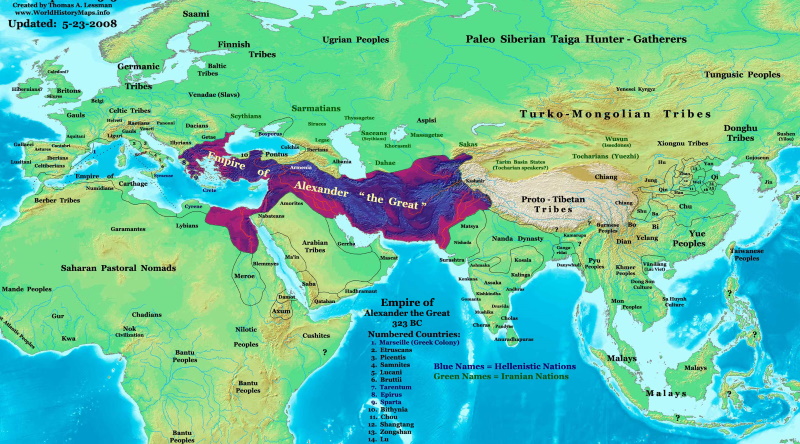
Alexander the Great Video
Things to Do
Recommended Books
Top 10 Worst Things about Ancient Greece You Wouldn't Want to Know!
by Victoria England
Tools of the Ancient Greeks: A Kid's Guide to the History & Science of Life in Ancient Greece (Build It Yourself)
Ancient Greece for Kids
by Captivating History

